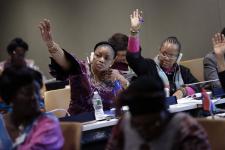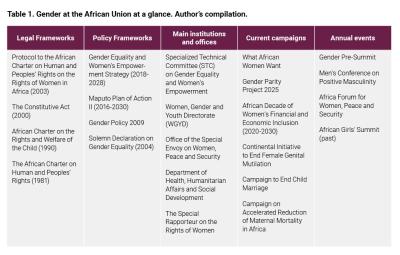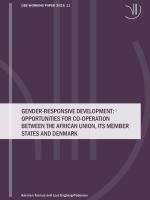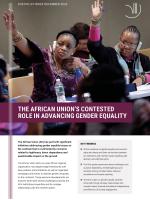The African Union's contested role in advancing gender equality

- African positions on gender equality and women’s rights are diverse and there are tensions between AU institutions and member states regarding safe abortion and LGBTQIA rights.
- The AU’s gender governance faces challenges such as donor dependency, limited legitimacy and authority among member states, and poor compliance and impact reporting.
- The AU’s impact on gender equality could be enhanced through stronger relationships with member states, financial and political independence, and effective civil society engagement.
The African Union (AU), as a pan-African regional organization, has adopted legal frameworks, soft laws, policies, and institutions as well as organised campaigns and events to address gender inequality on the continent. These welcome developments are however faced with several challenges posed by the AU’s institutional capacities and its complex relationships with the member states.
This brief analyses the AU´s attempts to address gender inequality and concludes that a more impactful pan-African gender governance could be established by working towards stronger collaborative relationships with member states, increased financial and political independence of the AU and enhanced engagement with CSO groups.
Regional gender equality priorities
Since the early 2000s, especially following the adoption of the Protocol to the African Charter on Human and Peoples’ Rights on the Rights of Women (the Maputo Protocol) in 2003, the AU has been developing institutions and strategies to address diverse manifestations of gender inequality on the continent (see Table 1. below). Both the AU and its member states prioritise the so-called harmful traditional practices, particularly female genital mutilation and child marriage. The AU’s work on positive masculinity (annual Men’s Conferences on Positive Masculinity) has articulated the role of male political, religious and traditional leaders in eliminating harmful practices and gender violence. Through conferences, the AU is working towards drafting the African Convention on Ending Violence Against Women and Girls. Additionally, the AU has focused on sexual and reproductive health and rights (particularly maternal health and mortality) and women, peace and security. More recently, the AU has directed its attention to women’s economic empowerment as part of the Decade of Women’s Financial and Economic Inclusion (2020-2030). Gender-inclusive responses to climate change are likely to be emerging policy areas which the AU has taken up at COP27 and the Commission on the Status of Women (CSW66) in 2022.
Contested issues
Despite the broad scope of AU policy and legal frameworks, the AU institutions and member states do not always see eye to eye when it comes to gender equality and women’s rights. Particularly, the AU has endorsed medicalised and safe abortion as a women’s right but at the same time highlights the need to align it with
- The Organization of African Unity, the predecessor of the AU, established the Gender Unit in 1992. It is currently called the Women, Gender and Youth Directorate.
- The African Union Commission has adopted the gender parity principle for choosing its commissioners.
- 44 out of 55 member states have adopted the Protocol to the African Charter on Human and Peoples’ Rights on the Rights of Women (the Maputo Protocol).
national laws and regulations. Several African countries have shown their disagreement with abortion rights at the global level, for example through the Geneva Consensus Declaration on women’s health and family values (co-sponsored by Egypt and Uganda, signed by Burkina Faso, Benin, Cameroon, DR Congo, the Congo, Djibouti, Eswatini, Gambia, Kenya, Senegal, South Sudan, Sudan and Zambia). Another point of contention is the rights of gender non-conforming or LGBTQIA people. Queer and same-sex relationships are, to varying extents, criminalized in many African countries. The African Commission on Human and Peoples’ Rights was put under pressure by the member states regarding the observer status of the Coalition of African Lesbians, leading the Commission to invoke its privileges in 2018. There is a diversity of opinions regarding those and other matters relating to the language of gender equality (concepts like intersectionality and femicide to name a few). The AU is sometimes required to provide a platform for debate; however, these debates are rarely conducted in public. The socio-cultural, religious and political diversity therefore makes it challenging for the AU to provide a universally-acceptable direction regarding gender equality.
Challenges of a regional approach
A review of the AU’s work on gender indicates major challenges in driving change in member states. For one, the sexual harassment occurring inside the African Union Commission (AUC) is an open secret, undermining its credibility as a norm-setter. Furthermore, the AU institutions are about 70% donorfunded. They direct much effort into managing donor relations, but their reliance on those relationships compromises their independence and legitimacy.
The socio-cultural, religious and political diversity makes it challenging for the AU to provide a universally-acceptable direction regarding gender equality.
The AU human rights regime is heavily expert-driven rather than member-state-driven, with bureaucrats and consultants as the central actors. Countries not complying with the AU’s gender norms have sustained little reputational damage as a result. The AU’s limited presence in its member states is another factor that exacerbates the distance between the AU and state governments. Finally, and in connection with the above, the AU member states only report back on the domestication and implementation of the AU policies irregularly. African countries are more likely to report back on the UN Convention on the Elimination of All Forms of Discrimination against Women. This gap makes it very difficult to estimate the AU’s impact on policy and practice within the individual member states. The AUC does not appear to be leading by example in this area, as there is little information and transparency regarding the effects of the AUC’s own initiatives.

Towards a more impactful gender governance
The AU has already built the normative foundations for its role in promoting gender equality in Africa and now needs to take steps towards increasing the impact of its work. Regardless of the difficulties, the AU provides a unique regional space for policy discussions and debates. Regional organizations are known to have an advantage when tackling normative issues like human rights and gender equality because they can speak with the voice of a common regional identity, better relate to regional and member state particularities and be more accessible for civil society organizations than global policy spaces. The above indicates that the AU’s authority and legitimacy could be enhanced in a few ways: by strengthening its co-operation with member states and by becoming less reliant on donor funding. The AU gender offices are already tackling the first issue by establishing presidential AU Champions on issues like FGM (Burkina Faso), gender and development (Ghana), ending child marriage (Zambia) and positive masculinity (DR Congo); however, it is important to extend those relationships beyond individual politicians. Last but not least, civil society faces major barriers in accessing the AU, which weakens the AU’s relevance for non-state actors. CSO participation will be important for ensuring a context-informed gender agenda as well as enforcing accountability regarding member states’ commitments.


